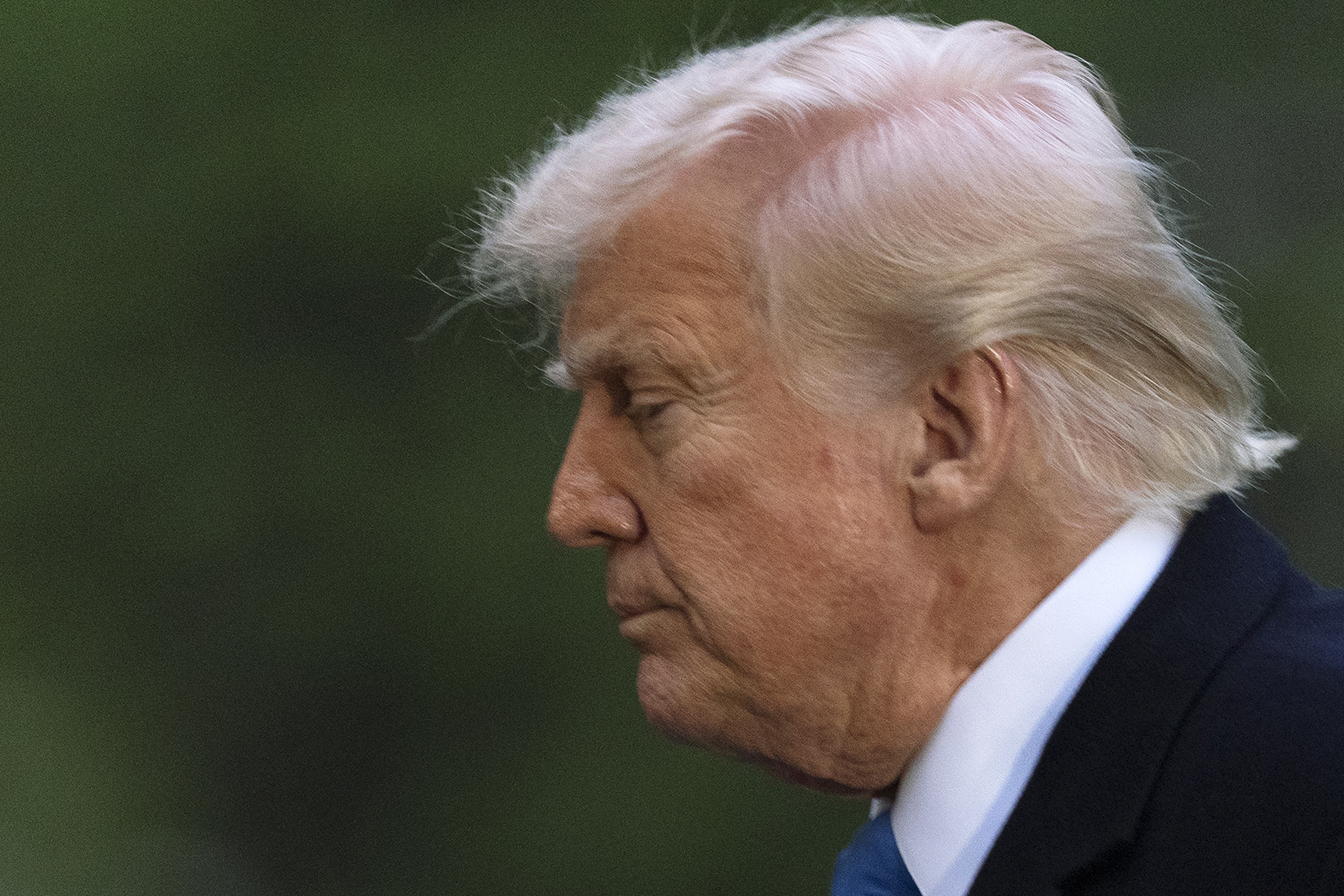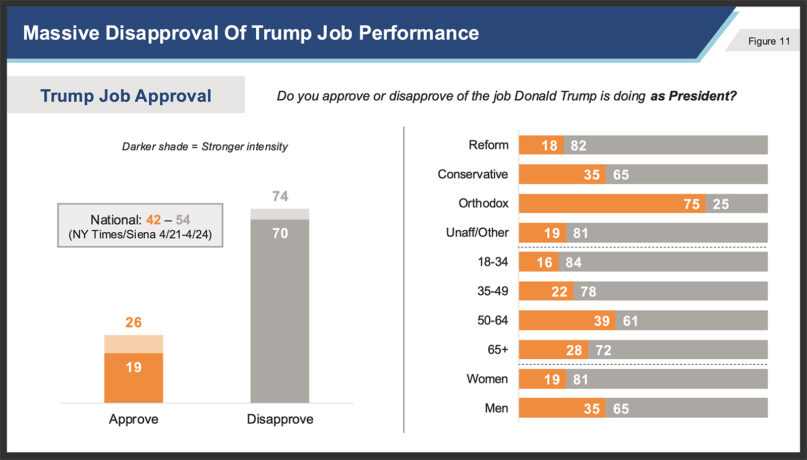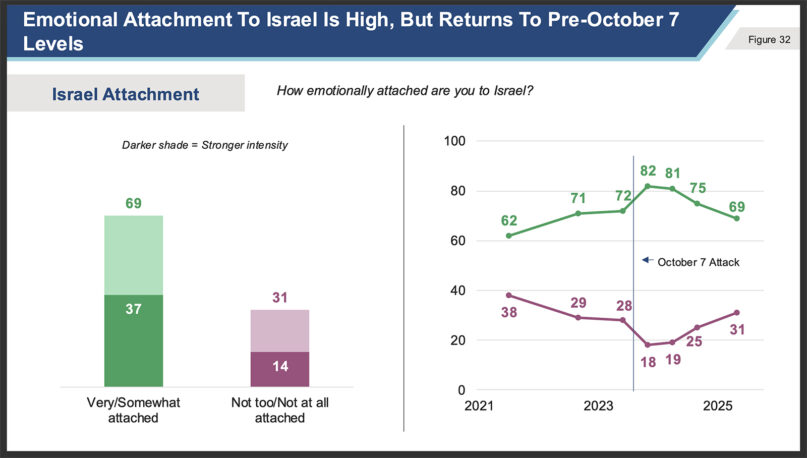
(RNS) — Shortly before the November elections, President Donald Trump promised American Jews, “I will be the best friend Jewish Americans have ever had in the White House.”
As president, he has moved to deport pro-Palestinian activists on college campuses and cut billions of dollars to elite universities for failing to combat antisemitism on campus.
But a new poll out Wednesday (May 14) shows American Jewish voters are not impressed.
The poll by GBAO Strategies, a longtime pollster of Jewish public opinion, shows that three-quarters of Jewish voters (74%) disapprove of Trump’s job performance (70% “strongly disapprove”). Most American Jews think Trump is “dangerous” (72%), “racist” (69%) and “fascist” (69%).
Perhaps most tellingly, 52% of American Jewish voters think Trump is antisemitic.
“The intensity of the opposition is extraordinary,” said Jim Gerstein, GBAO’s founding partner who summarized the poll’s results to reporters Tuesday. “This very high level of disapproval far exceeds what you see in the national population.”

“Massive Disapproval of Trump Job Performance” (Graphic courtesy of Jewish Voters Resource Center)
The poll was taken among 800 U.S. Jewish voters April 21-May 1. It has a margin of error of plus or minus 3.5 percentage points.
The poll shows American Jews think Trump’s actions, purportedly taken to halt antisemitism, actually increase antisemitism.
For example, 61% of American Jews said arresting and deporting pro-Palestinian protesters who are legal residents of the United States increases antisemitism. (Several former Columbia University students have been detained by Immigration and Customs Enforcement for their pro-Palestine activism despite being permanent residents.)
And 49% of American Jews think withholding federal funding from universities will increase antisemitism. (Another 26% said it would have no impact.)
“I think it’s very scary to a lot of Jews that someone can be whisked off the street and sent away because of the whim of the government,” said Ian Lustick, professor emeritus of political science at the University of Pennsylvania, referring to the arrests of pro-Palestinian student activists. “Jews are attached to the idea of law. It’s in our DNA to believe in the rule of law, and that’s very scary to see that flagrantly abused.”
The poll shows American Jewish attachment to Israel has fallen from its post-Oct. 7, 2023, high, after the Hamas attack on Israel that killed 1,200 people and took 251 people hostage into Gaza. In the latest poll, 69% of American Jews say they are emotionally attached to Israel, down from a high of 82% shortly after the attacks in 2023.
Asked, “Do you think someone can be critical of Israeli government policies and still be ‘pro-Israel’?,” more than 9 in 10 American Jews (92%) said yes.

“Emotional Attachment to Israel Is High, but Returns to Pre-October 7 Levels” (Graphic courtesy of Jewish Voters Resource Center)
RELATED: 550 US rabbis sign letter condemning Trump’s antisemitism policy
Israel’s war in Gaza has hastened a growing conflict between American Jews and the establishment institutions they created. Leaders of legacy American Jewish organizations, such as the Anti-Defamation League and the American Jewish Committee, have defended Israel, demonized Jews who criticize Israel as antisemitic and accommodated to Trump’s policies.
Last month, Eric Fingerhut, CEO of the Jewish Federations of North America, sent Jewish federation affiliates across the country a letter in which he said he suggested that he supported the Trump administration’s plans to deport students and penalize universities and said those students “are receiving due process and are represented by able legal counsel.”
That imbalance between the views of American Jews and their institutional leaders extends to views of Trump more generally, and that divide will have long-term consequences, said Eric Alterman, a historian and the author of the 2022 book, “We Are Not One: A History of America’s Fight Over Israel.”
“They are losing all credibility with American Jews, especially young American Jews, and quite possibly pushing them away from their Jewish identity, or at least pushing them to seek other avenues with which to express their identity,” Alterman said.
The poll shows that among younger American Jews, fewer are concerned about antisemitism. While 95% of Jews over 65 said they were concerned about antisemitism, 77% of Jews aged 18-34 were. Asked their concerns about antisemitism on college campuses, 65% of younger Jews expressed concern (39% were “very concerned”).
Seven in 10 Jews aged 18-34 (71%) believe deporting campus protesters increases antisemitism. Attachment to Israel is also lower among this age group, with 55% saying they are emotionally attached to Israel (24% say they are “very attached”).

“Youngers Jews Much Less Concerned About Antisemitism Than Older Generations” (Graphic courtesy of Jewish Voters Resource Center)
The one group of American Jews whose views on Trump are strikingly different are the minority Orthodox community, which accounts for about 10% of all U.S. Jews.
Seventy-five percent of Orthodox Jews approve of the job Trump is doing. Among this group, 61% believe Trump shares their values, 70% say he has the right priorities and 80% say Trump is a strong leader. By contrast, only 15% of Reform Jews, the country’s largest denomination, say Trump shares their values.
U.S. Orthodox Jews are also far more supportive of Israeli Prime Minister Benjamin Netanyahu. Asked if Netanyahu’s decision to resume military action in Gaza was driven by national security considerations or personal political considerations, 62% of American Jews answered, “Netanyahu’s personal political considerations.” Among Orthodox Jews, only 23% believed it was personal considerations, with 77% saying national security was the reason for a resumption of hostilities.
“Orthodox Jews have become much more right-wing as (other U.S.) Jews have either stayed liberal or moved leftward,” said Alterman.
The poll was conducted for a new nonpartisan group called the Jewish Voters Resource Center that will collect and disseminate data on Jewish voters and issues.
RELATED: At Jewish Voice for Peace conference, a balance of popularity and risk under Trump
